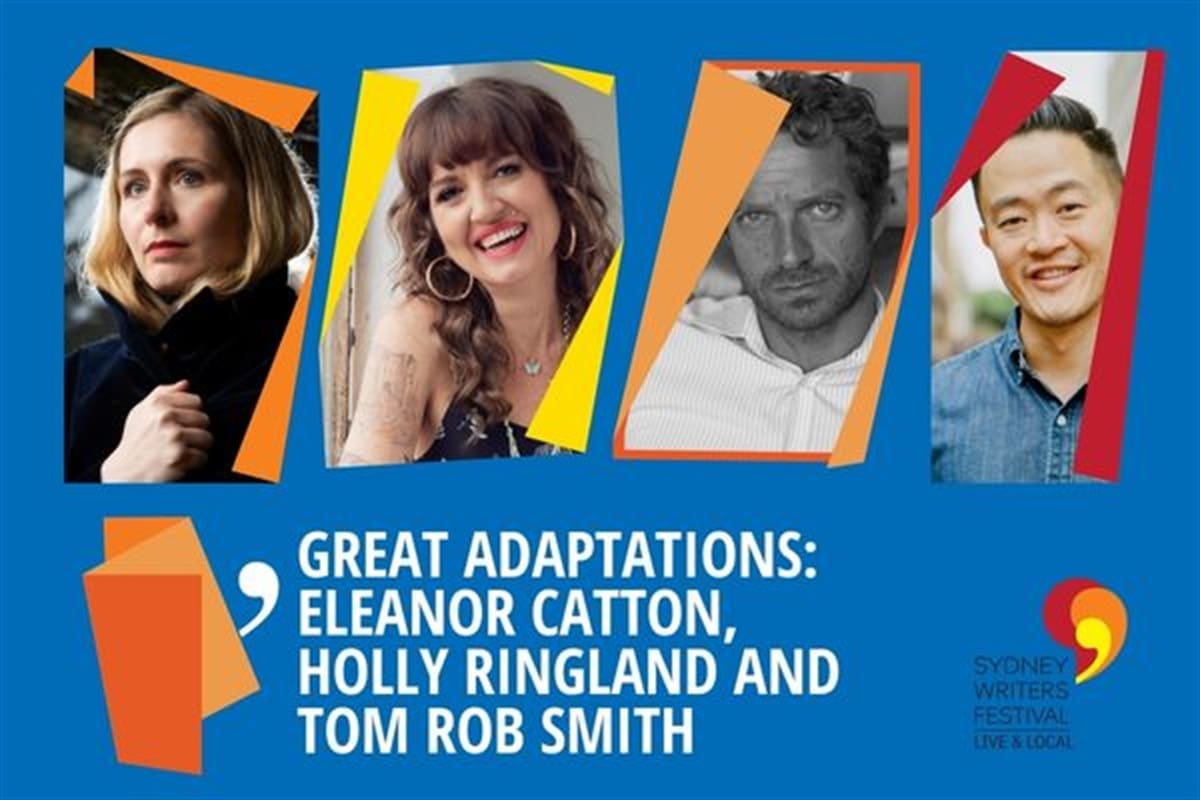As I sat down for the Sydney Writers’ Festival Great Adaptations panel, I heard from writers from all walks of the world — Australia, New Zealand, and England/Sweden — gathered together to discuss the turbulent journey of bringing novels to the big and small screen.
Attending this panel of authors, in conversation with Benjamin Law (The Family Law), was truly insightful. Throughout the event, Law posed comprehensive and witty questions to the panellists — Eleanor Catton, Holly Ringland, and Tom Rob Smith — about adapting “beloved” books onto the screen, namely exploring the exchange of trust from author to adaptor.
Holly Ringland’s novel, The Lost Flowers of Alice Hart, has been turned into an upcoming Amazon Prime series starring Sigourney Weaver. Ringland delved into the “mind-meld” and synchronisation between her and writer Sarah Lambert. She even entertained the thought that Lambert could have written her novel based on her strong grasp of the story. In Ringland’s view, Lambert’s episodes were better than what she could have written, including accurately translating implied details. Ringland admitted that since she already birthed Alice Hart from her body onto the page, she could not have done it again.
In contrast to Ringland, Tom Rob Smith, primarily known for the Child 44 trilogy, spoke in length about interacting with Hollywood heavyweights and their “formal” process. The novel, one of the first to have been inspired by crimes occurring in Stalinist Soviet Union, became a film produced by Ridley Scott, written by Richard Price, starring Tom Hardy and Gary Oldman. Being in awe of the creatives, he said he was more likely to say yes to creative decisions to avoid being labelled “difficult”. For example, he was taken aback by the “hyeavy Ryussian accyents” on his first day on set.
With hindsight, Smith agreed that a “mind-meld” is necessary to translate the novel’s emotional core and theme of “injustice”, rather than focusing on the plot. He was not asked to write the adaptation, but was recently offered to pen a remake TV series. However, returning to the material after so long felt odd, emphasising that unsuccessful adaptations can change people’s relationship with the book.
Smith also wrote The Assassination of Gianni Versace: American Crime Story — based on Maureen Orth’s book Vulgar Favours — winning a Writers Guild, Emmy, and a Golden Globe Award. He mistakenly used the out-of-date first edition, containing the name of an individual who was outed as gay. The name made it all the way to the show. Concerns were also raised about the representation of homophobia by the author — a straight woman — though Smith was careful to explore the lives of the figures intertwined in the crime, not just the crime itself.
Eleanor Catton, the youngest Man Booker Prize winner, spoke about adapting her 800 page door-stopper The Luminaries which took “7 years, 300 drafts and plenty of crying”. She initially wrote like an author rather than a screenwriter, ultimately writing into the actor’s performance. Everyone around her tried to dissuade her from penning the adaptation. They argued that it would risk trapping her in her story, and thus, shave years off her creative and real life.
She said, “If you added up all the hours that everybody spent on the show, and presented it as if one person was working a 9-to-5 job, they would have started work at the time of King Henry VIII continuously to the present timeline”.
A common perspective then emerged: to adapt your own book means that you are increasingly critical of the work itself, and must ponder what other iterations could have been by the time the camera rolls. Despite historical inaccuracy, Catton added more female characters in the screen version to cater for the post-MeToo era. She also preferred adapting another author’s work, citing Jane Austen’s Emma, as it allowed for a firm stance on the material whilst being a fan. Austenites rejoiced when she wholeheartedly stated that she “would defend the novel Emma, to my dying breath”.
The author-to-screenwriter learning curve continued on set because of budgetary and time constraints. For example, adding digital snow costs more than book snow, or going from a dozen characters in a scene to two speakers, plus one cameraperson and boat driver.
As for the on-screen magic, moderator Law was shocked by the recreation of his childhood home in his TV show. Ringwald was excited by all the movie parts intersecting with her brain’s worldbuilding. Smith was impressed by the faking of moonlight with a floating mattress.
During the audience Q+A, I posed a question regarding the ongoing Writers Guild America strike. Smith said he too is on strike, and that streaming has definitely rendered things difficult. While there is a “bundle of issues”, the fundamental concern was the inability for writers to survive on their current income, or even being able to access the United States’ healthcare system.
All in all, the talk was highly enjoyable. It highlighted that authors either separate the adaptation from their original novel and “hand over the baby” to be deconstructed, or remain creatively involved to ensure its essence remains present.
Eleanor Catton’s most recent book, Birnam Wood, is out now. So too is Holly Ringland’s second novel, The Seven Skins of Esther Wilding, and Tom Rob Smith’s novel, Cold People, as well as his Hulu miniseries, Class of ‘09.





